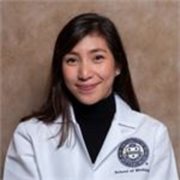Antoinette Montelibano
 Antoinette is a first generation-immigrant from the Philippines, where she studied nursing back in her hometown. After moving to America, she worked as a bone marrow transplant nurse in Mount Sinai Hospital in New York for six years. There she discovered my passion for medicine and research. She worked on cancer research projects with her colleagues and started taking a post-baccalaureate pre-health course at NYU. Her free time was spent traveling and backpacking alone, immersing herself in different cultures. While her journey has brought her to the U.S., Antoinette’s clinical and community health experiences in rural areas in the Philippines and travels have led to her continued interest in global health and tropical medicine.
Antoinette is a first generation-immigrant from the Philippines, where she studied nursing back in her hometown. After moving to America, she worked as a bone marrow transplant nurse in Mount Sinai Hospital in New York for six years. There she discovered my passion for medicine and research. She worked on cancer research projects with her colleagues and started taking a post-baccalaureate pre-health course at NYU. Her free time was spent traveling and backpacking alone, immersing herself in different cultures. While her journey has brought her to the U.S., Antoinette’s clinical and community health experiences in rural areas in the Philippines and travels have led to her continued interest in global health and tropical medicine.

Schistosomiasis in School-Age Children in Calatrava, Negros Occidental, The Philippines: a 10- Year Follow-Up Study
University of the Philippines Manila College of Public Health
Philippines
What does the Kean Fellowship mean to you?
Receiving this fellowship is such an honor. This has provided me the opportunity to go back to my roots while also pursuing my interests in global health. I have seen firsthand what poverty and healthcare disparities look like in a third world country like the Philippines and I am humbled to be given the chance to interact with the members of the community directly involved in the fight to make a difference. I hope that through this research, I could also contribute to the Filipino community in some way. I look forward to the learning experience and to returning with a deeper understanding of global health issues.
What do you anticipate learning?
This fellowship has given me the opportunity to lead my own study so that I may create a better foundation of the basics of research and acquire new skills in global and qualitative research. This pandemic has been such a difficult time for everyone. I hope to get a better understanding of how different communities and societies as a whole are protecting vulnerable populations, identifying the gaps and strengths of public healthcare delivery, and adapting to current challenges in this setting. I anticipate to learn from the resourcefulness of experienced community health workers and local organization members, so that I may apply this in my professional practice in the future. I want to come out of this experience a better healthcare provider, one that will make an impact on the lives of others and on the medical field itself.
What interests you about tropical medicine and what problems are you interested in solving?
Having lived in the Philippines for a large part of my life, I have seen tropical diseases affect people close to me, my friends and family. As a student nurse, I saw patients suffering and dying from preventable and treatable infections. Tropical medicine has been such a large part of my life and is still a part of the lives of people in my home country, that it continues to be relevant to me. What interests me is that a lot these diseases are linked to healthcare disparities and social determinants of health, such that searching for solutions to these illnesses may also mean finding solutions to problems of inequity in society. This field of practice is the epitome of holistic and interdisciplinary care, the kind of care I aspire to provide to my patients in the future.